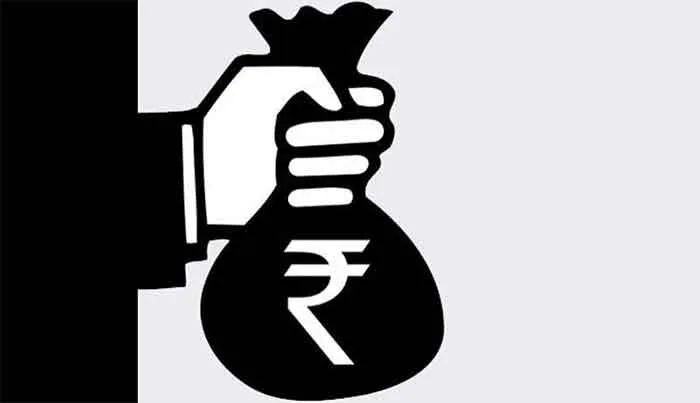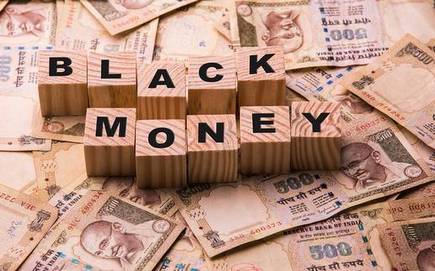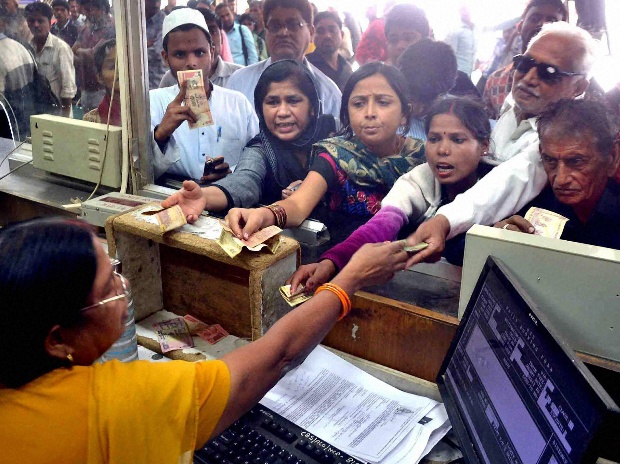
Once in 2010, I visited Vivekananda International Foundation, the New Delhi-based think tank founded by Ajit Doval, the present National Security Advisor and one of the most powerful men in the country. As an anti-corruption activist interested in learning about the foundation’s anti-black money campaign, I had an appointment with Doval, who headed the think tank at the time.
However, on reaching there, I was told by one of the researchers that the director would be unable to meet me as he was caught up with some foreign visitors. Perhaps as consolation, the researcher handed me a copy of one of their publications, The First Interim Report of the Task Force on Black Money. The ‘Task Force’ had four members (2) Ajit Doval (1) Gurumurthy, chartered accountant and Swadeshi Jagaran Manch Co-Convenor (3) R. Vaidyanathan, Professor of Finance at the Indian Institute of Management, Bangalore, and (4) Mahesh Jethmalani, senior advocate at the Supreme Court.
Two months later I met Gurumurthy, who suggested that I arrange as many programmes as I could to highlight the issue of black money. I proceeded to study the issue, after which I conducted several workshops and meetings on black money across the country. I was invited to other programmes as a speaker. Partly as a result of this work, we succeeded in making black money and corruption the hottest issues debated in the country ahead of the 2014 parliament election. The BJP won a landslide victory in the election and formed the government under Narendra Modi, changing Indian history permanently.
In the years since, two of the biggest campaigners against black money have come to occupy positions that are critical to take action on the issue. Doval was appointed National Security Advisor, while Gurumurthy became a non-executive director of Reserve bank. The report of the Task Force which they both were part of had said: “Creating a powerful public opinion and broad national consensus on the issue. Those who do not support the move should be seen as supporters of black economy”. We must ask these former crusaders: what concrete actions have they taken to tackle black money? Or even to influence public opinion about the matter?
Since we know they haven’t bothered to address the issue, are we to conclude that – following their own formula – they have become “supporters of black money”? After all, they have been elevated to positions where they can actually act on their demands.
Their report further said, “India must become a very active player in the G-20 efforts against secret banking and tax havens. India must appoint a special ambassador with adequate knowledge of tax havens and secret banking issues to work with G-20 specifically to frame India-friendly rules.” India now chairs the G-20. We have seen an unprecedented publicity blitzkrieg trumpeting this ‘achievement’ (which actually happens by rotation) and India’s newfound influence on the worlds stage. Yet, we don’t know of a single thing that Doval and Gurumurthy, both occupying powerful positions and known for their proximity to the PM, have done to influence the G-20 on black money.
To quote from their report, “India must urge the German government to provide the details of the Indian names from the LGT bank’s secret records. The BJP, if voted to power, must send a special emissary to Germany, which is willing to give the details of Indian names in the LGT bank’s secret records”. It has been almost a decade since the BJP came to power. Whatever happened to LGT bank’s secret records?
Criticizing the UPA government, the 2010 report said, “US President Barrack Hussein Obama is concerned about it, German Chancellor Angelina Merkel is furious about it and French President Sarkozy want to regulate it. They are off-shore financial centers where the ill-gotten wealth of tax evaders of many countries is hoarded. But surprisingly the leaders of one of the most affected country, namely India, are not making the least noises about them and doing virtually nothing about them” Extending the same argument, we must ask, what exactly has the Narendra Modi-led NDA government done on the matter?
A second report by the Task Force says, “Philippines slogged for 18 years but finally successfully got repatriated the bribe money of its former President Ferdinand Marcos ($ 624 million) held in Swiss Bank accounts. Between 2001-2004, Peru recovered $180 millions stashed away in tax havens by Vladimiro Montesinos. Between 2005-2006, Nigeria recovered USD 505 million of the Sani Abacha money frozen and forfeited by Swiss authorities. The Jews got back the money [in 2002] appropriated by these banks from Jews in the 1936-1945 period of Hitler’s dictatorship and mass deaths.” We must ask: in nine years how much have the BJP government brought back?
On page 27 of the second report, it says, “The issue of global black money is not just an issue of tax evasion, or bribe or kickbacks. It is also related to global and national security. The global black funds also finance terror and affect national security.” Are we to think that appointing one of the authors of the report, Ajith Doval, as National Security Advisor is all it takes to magically prevent black money from going into to the hands of terrorists?
Pages 38 to 65 of that report only deal with the case of the arms trader Hasan Ali Khan. It states Ali had Rs. 8.04 billion in a Swiss bank account, was linked to terrorist organisations, and even had ties to some Congress leaders. And yet, in 2015 Ali got out of prison on bail. His trial had not even started till his death in 2023! So why did our anti-black money crusaders neglect this arms trader and terrorist financier – and his Rs. 8.04 billion worth illicit fortune – all these years?
From page 65 to 74, the report discusses the Bofors case, and the nexus between the Bofors pay-off and Sonia Gandhi, the chairperson of the UPA, the Quattrocchi episode etc, including how the UPA buried the case. It highlights several sources which reveal details of the case, including the Schweizer Illustrierte investigation report which talks of Rajeev Gandhi’s Swiss bank account, and Soviet journalist Dr. Yevgeniya Albats’ book The State within a State: KGB and Its Hold on Russia. Albats, who was given full access to secret files of the KGB, disclosed in her book that KGB chief Victor Chebrikov in December 1985 had sought in writing from the Central Committee of the Communist Party of the Soviet Union (CPSU), ‘authorization to make payments in US dollars to the family members of Mr. Rajiv Gandhi, namely Sonia Gandhi, Rahul Gandhi and Ms Paola Maino, mother of Sonia Gandhi.’ Why have the BJP under Narendra Modi failed to initiate an inquiry into the Bofors case? After shouting yourself hoarse about the Gandhi family’s black money, why haven’t our anti-black money crusaders pushed for an inquiry into the matter?
Question to Subramanian Swamy.
In the year 2002, Dr Subramanian Swamy, the president of the Janata Party, had put out the photocopies of the pages of Schweizer Illustrierte and Dr Albats’ book on the Party website of the Janata party, along with a letter in a Swiss magazine dated 23.2.2002 in which the confirming that Rajiv Gandhi had a total of Swiss Franc 2.5 billion [$2.2 billion] in a secret Swiss bank account. What has Subramanniam Swamy done about this matter in the parliament when he was a member of the house?
Swami speaks a lot on Participatory-notes (P-notes), a financial instrument used by foreign Institutional investors (FIIs) to invest in the Indian market. In a March 30, 2012 speech, Swami talks about how P-notes affect our national security. In 202, foreign investment in Indian capital markets through P-notes increased to Rs 95,911 crore at the end of April from Rs 88,600 crore in March-end, PTI has reported citing SEBI data. Were P-notes safe when Swami was part of the government? Swami similarly talks about round tripping of capital through Mauritius. What, in that case, is Swami’s opinion on the Adani Group’s financial malpractices, as revealed by the investment firm Hindenburg? Does it not prove round tripping?
The double standards involved in the matter don’t end here. Here are some questions to the Sangh Parivar, and especially the BJP, on the matter:
The Task Force report offers 23 suggestions, which it is describes as “constitutional, legal, political and geo-political measures to unearth and bring back the Indian monies illegally stashed abroad,” to the government of India to bring back black money. Is there a single suggestion among these that the BJP or RSS has pressed for since coming in power in 2014?
The conclusion of the report says: “Our Republic is under siege. Our polity is in shambles. We are at cross roads. Wikileaks mocks at us in terms of revealing the names of our current icons as men who plundered.” The report continues. “We are in an extraordinary time. This ancient nation rebuilt by Mahatma Gandhi; Sardar Patel; Pundit Nehru; Babasaheb Ambedkar; Netaji Bose; Rajaji and many other eminent men who towered over our mother earth is in crisis because of these plunderers.”
Of late, there have been reports that suggest that Indian black money in tax havens is increasing. The Hindenburg report clearly reveals the round tripping of black money through these tax havens. All this, under the watch of former anti-black money crusaders Doval and Gurumurthy.
The conclusion further states: “The issue spills beyond economic stability; it has the potential to dynamite the economic system itself; it has potential to destroy the global security itself as the terrorists are funded by secret and not open financial system. The Task Force is of the view that the information and the ideas contained in this and in its earlier report must be taken to the people of India at various levels. The Task Force hopes that the BJP will dedicate itself to the cause and associate as many critical forces, in and outside politics, in the sacred agenda.”
The 2010 anti-black money Task Force’s vision cannot be faulted for lack of ambition. But first let us ask the visionaries themselves – Doval and Gurmurthy, but also their hyper-patriotic compatriots including the so-called Chaukidar of India – whether they are dedicated to this cause at all. After all, chaukidari, like charity, must start at home.
K.V. Biju is National Convener, Swadeshi Andolan. He can be reached at [email protected]











































